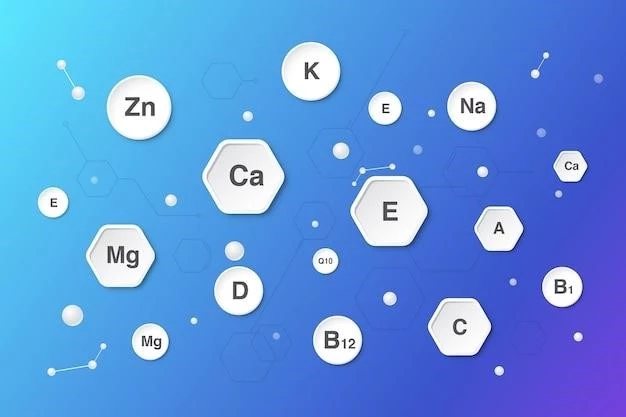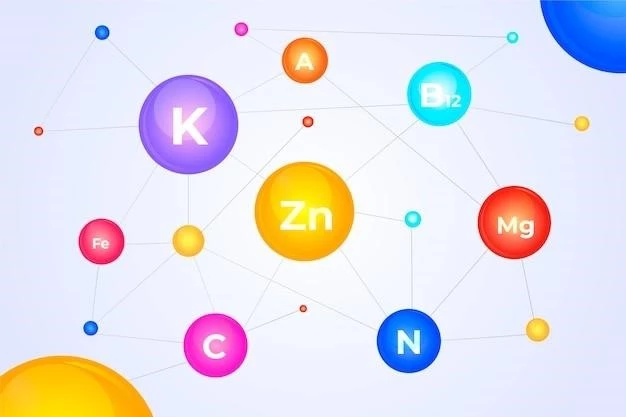Zinc citrate is commonly used to boost immune function, promote wound healing, and support overall health. It is also known for its antioxidant properties that help protect cells from damage.
Zinc Citrate Uses and Benefits
Zinc citrate, a form of zinc combined with citric acid, offers a range of uses and benefits⁚
- Immune Support⁚ Zinc citrate plays a vital role in supporting the immune system by aiding in the development and functioning of immune cells.
- Wound Healing⁚ It promotes wound healing by supporting collagen synthesis, which is essential for skin repair.
- Antioxidant Properties⁚ Zinc citrate acts as an antioxidant, helping to protect cells from oxidative stress and damage.
- Hair and Skin Health⁚ Zinc citrate contributes to healthy hair, skin, and nails by supporting their growth and maintenance.
- Supports Gut Health⁚ It helps maintain the integrity of the gut lining and supports digestive health.
- Regulates Hormones⁚ Zinc citrate plays a role in hormone regulation, which can benefit reproductive health.
- Healthy Aging⁚ Zinc citrate’s antioxidant properties may help slow down the aging process by combating free radicals.
- Enhances Taste Perception⁚ Zinc citrate deficiency can lead to altered taste sensation, and supplementation may help improve taste perception.
Overall, incorporating zinc citrate into your daily routine can contribute to various aspects of health and well-being.
Side Effects of Zinc Citrate Supplements
While zinc citrate supplements offer numerous benefits, it’s crucial to be aware of potential side effects that may occur⁚
- Gastrointestinal Distress⁚ Some individuals may experience stomach upset, nausea, vomiting, or diarrhea when taking zinc citrate supplements.
- Changes in Taste⁚ An uncommon but reported side effect is a temporary alteration in taste perception, often described as a metallic or bitter taste.
- Copper Deficiency⁚ Prolonged or excessive intake of zinc without adequate copper supplementation can lead to copper deficiency, causing its own set of health issues.
- Interactions with Medications⁚ Zinc citrate can interact with certain medications, affecting their absorption or efficacy. It’s important to consult a healthcare provider before combining zinc supplements with other drugs.
- Zinc Toxicity⁚ Taking very high doses of zinc over an extended period can lead to zinc toxicity, characterized by symptoms like abdominal pain, headaches, and fatigue.
- Immune System Imbalance⁚ Excessive zinc intake can disrupt the balance of other minerals in the body, potentially impacting immune function.
- Allergic Reactions⁚ In rare cases, allergic reactions to zinc citrate supplements may occur, leading to symptoms such as rash, itching, or difficulty breathing.
It’s essential to follow recommended dosages and consult a healthcare provider before starting any zinc supplementation to minimize the risk of adverse effects.
Zinc Citrate for Diarrhea Management

Zinc citrate is recognized for its potential in managing diarrhea, especially in certain populations⁚
- Acute Diarrhea⁚ Studies suggest that zinc supplementation, including zinc citrate, can help reduce the duration and severity of acute diarrhea episodes, particularly in children.
- Chronic Diarrhea⁚ For individuals with chronic diarrhea conditions, zinc citrate may play a role in improving gastrointestinal health and reducing the frequency of loose bowel movements.
- Benefits for Malnourished Individuals⁚ Zinc deficiency is common in malnourished populations and can contribute to diarrhea. Zinc citrate supplementation can help address this deficiency and alleviate related symptoms.
- Support for Gut Health⁚ Zinc citrate’s anti-inflammatory and antioxidant properties may support gut integrity and function, contributing to a reduction in diarrhea incidence.
- Prevention of Diarrhea in Travelers⁚ Traveler’s diarrhea is a common issue when visiting certain regions. Zinc citrate supplements taken preventively may help reduce the risk of traveler’s diarrhea.
- Child Health⁚ Zinc citrate supplementation is especially beneficial for children with diarrhea, as zinc plays a crucial role in immune function and overall health in this age group.
- Consultation with Healthcare Providers⁚ Individuals experiencing diarrhea, especially persistent or severe cases, should consult healthcare professionals before starting any supplementation regimen, including zinc citrate.
When considering zinc citrate for diarrhea management, it is essential to follow recommended guidelines and seek medical advice for individualized recommendations.
Recommended Dosage of Zinc and Quercetin Supplements
When considering supplementation with zinc and quercetin, it is important to follow recommended dosages to ensure safety and efficacy⁚
- Zinc Citrate Dosage⁚ The recommended daily intake of zinc citrate can vary depending on age, sex, and specific health needs. Generally, doses range from 5 mg to 40 mg per day.
- Quercetin Dosage⁚ Quercetin supplements are available in various forms, and typical dosages range from 500 mg to 1000 mg per day. Dosage may vary based on the formulation and intended use.
- Combination Supplements⁚ Some formulations combine zinc and quercetin for synergistic effects. In such cases, it is essential to follow the recommended dosage provided on the product label or as advised by a healthcare provider.
- Consultation with Healthcare Providers⁚ Before starting any new supplement regimen, including zinc and quercetin, individuals should consult with healthcare professionals to determine the appropriate dosage based on their health status, potential interactions with medications, and specific health goals.
- Monitoring and Adjustments⁚ Regular monitoring of zinc and quercetin levels in the body, along with symptoms and health outcomes, can help guide adjustments to the dosage as needed for optimal benefits.
- Cautions⁚ Excessive intake of zinc or quercetin supplements beyond recommended levels can lead to adverse effects. It is crucial to adhere to dosage guidelines and seek guidance from healthcare providers if in doubt.
Following proper dosage recommendations enhances the safety and effectiveness of zinc and quercetin supplementation for various health purposes.
Zinc Citrate in Dental and Oral Health Products
Zinc citrate’s properties make it a valuable component in dental and oral health products, offering several benefits⁚
- Plaque and Tartar Control⁚ Zinc citrate is known for its ability to inhibit plaque formation on teeth, reducing the risk of tartar buildup and maintaining oral hygiene.
- Supports Gum Health⁚ Zinc citrate’s anti-inflammatory properties can help support gum health by reducing inflammation and promoting healing in conditions like gingivitis.
- Bad Breath Control⁚ Zinc citrate is often included in oral care products for its odor-reducing properties, helping to combat bad breath by targeting the bacteria that cause it.
- Tooth Sensitivity Relief⁚ Some toothpaste formulations with zinc citrate may provide relief from tooth sensitivity by forming a protective barrier on the teeth.
- Prevention of Oral Infections⁚ Zinc citrate’s antimicrobial properties can help prevent oral infections by inhibiting the growth of various bacteria in the mouth.
- Enhances Cavity Protection⁚ Incorporating zinc citrate in dental products may enhance cavity protection by aiding in remineralization and strengthening tooth enamel.
- Professional Recommendations⁚ Dentists and oral health professionals may recommend products containing zinc citrate to individuals with specific oral health concerns or conditions.
From toothpaste to mouthwash, zinc citrate plays a vital role in maintaining optimal dental and oral health by addressing various issues and promoting overall oral hygiene.
Adverse Events and Drug Interactions of Zinc Supplements
While zinc supplements offer various health benefits, it is crucial to be aware of potential adverse events and drug interactions that may occur⁚
- Gastrointestinal Upsets⁚ Common side effects of zinc supplementation include nausea, vomiting, and diarrhea, especially when taken in excess.
- Copper Deficiency⁚ High doses of zinc over a prolonged period can lead to copper deficiency, impacting various biological functions dependent on copper.
- Immune System Imbalance⁚ Excessive zinc intake can disrupt the balance of copper, iron, and other minerals in the body, affecting immune function and overall health negatively.
- Zinc Toxicity⁚ Symptoms of zinc toxicity include abdominal pain, nausea, fatigue, and copper deficiency. High doses of zinc should be avoided to prevent toxicity.
- Interactions with Medications⁚ Zinc supplements can interact with certain medications, such as antibiotics and diuretics, affecting their absorption or efficacy. Consultation with a healthcare provider is essential.
- Allergic Reactions⁚ Rarely, individuals may experience allergic reactions to zinc supplements, leading to symptoms like rash, itching, and difficulty breathing.
- Pregnancy and Breastfeeding⁚ Pregnant and breastfeeding women should be cautious with zinc supplements as excessive intake can be harmful to the developing fetus or infant.
It is vital to follow recommended dosages, monitor for adverse effects, and seek guidance from healthcare professionals, especially when incorporating zinc supplements into your daily regimen.
